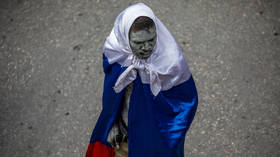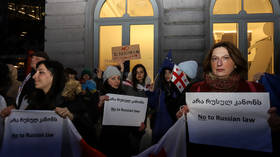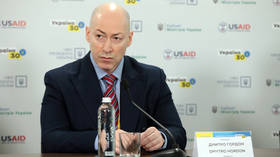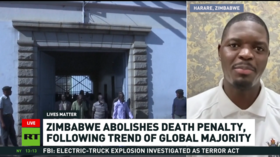From WWI to the Ukraine conflict, war propaganda evolves, but never changes

Since the beginning of Russia’s military operation in Ukraine, Western spin-doctors have been busy. But despite the rapid technological progress that changed the world over the last decades, the principles of war propaganda remain the same.
Thomas Hobbes, the 17th century English philosopher, considered war as the natural state of mankind. His 20th century counterpart, Carl Schmitt, explained that war is the utmost political action. Consequently, just as with any policy, war has to be the subject of intense propaganda from all sides of a conflict. War propaganda, however, is something quite recent in human history. War always had to be justified in some way, but the appearance of photography, modern communications technology and mass media meant it has become an essential part of warfare.
The birth and fate of war propaganda
The first modern coverage by a journalist of an armed conflict is usually considered to be William Howard Russell’s work during the Crimean war of 1852-1855. However, politicians and armies started to really take the impact of journalism on populations into consideration only with the Boer war, fought between the British Empire and Dutch-speaking republics of southern Africa in 1899-1902.
The British government faced a lack of support at home and a propaganda strategy from the Boers, who internationally directed their newspapers and agents in the hope of gaining foreign support. A war-time propaganda strategy had to be, and was, elaborated.
As Kenneth O. Morgan, from Queen’s college, Oxford, puts it: “The consequences of the Boer War on the media and its representation of war were inevitably massive […] The media coverage did have an important effect in helping to stimulate anti-war sentiment in the later stages of the war."
Democracies such as France and the UK even began to work closely together during the First World War. During the 1920s and ‘30s, they elaborated various strategies, including radio programs and air-dropped propaganda leaflets, in order to have the enemy population revolt against its leaders or at least develop anti-war sentiments. However, during a conflict, internal stability and unity are essential, and as such war propaganda has to focus mainly on domestic publics.
In a 1944 text entitled ‘What is propaganda?’ (available on the site of the American Historical Association), Professor Ralph D. Casey drew a quite surprising conclusion:
“These simple truths determine the underlying or governing principles of democratic propaganda. The Nazis blindfold their people against the truth. In exact opposition to the rules of Hitler, the democratic countries must present the truth in their propaganda. A free people will soon find out the truth in spite of official suppressions and distortions. And when propaganda has been revealed to be deceitful and distorted, it no longer is effective. Moreover, democratic propaganda must observe the right of the people to know the facts, however unpleasant they may be. The strategy of truth is not only in accord with the basic principles of democracy, but is also a hardheaded and realistic policy for effective dealing with allies, neutrals, and even enemies.”
Conversely, history shows that the war propaganda strategies that have been developed, both before and since Casey’s statement, fully contradict this recommendation. “When war is declared, truth is the first casualty” – while the quote may have been wrongly attributed to him, British politician Arthur Ponsonby had exhaustively worked on the matter. His book ‘Falsehood in Wartime’ (1928) describes the lies that were propagated by Western democracies against the Kaiser’s Germany. In 2001, Belgian historian Anne Morelli systemized Ponsonby’s thoughts and remarks in her work ‘The Basic Principles of War Propaganda’. Most of her arguments can fit the war propaganda of any type of regime, but Western democracies resort to them with exceptional effectiveness. Since the Cold War, the strategic approach has been dominated by the US, which has the biggest number of think tanks, bolstered by European strategic foundations which are largely Atlanticist.
Wars for peace
Democracies do not want war, their adversary is the only one responsible. If the Western rhetoric is to be believed, liberal democracies can only be the targets and victims of other types of political regimes, which want to attack their freedom, destroy their values or undermine their model. According to the official version of historical events, Germany solely desired WWI, Germany and Japan provoked WWII, and the Soviet Union’s attitude was solely responsible for the Cold War. Currently, the Western mass media frame Russia as the only country responsible for the ongoing conflict in Ukraine.
The simplicity of this political discourse is such that most Western populations are convinced that their country can’t desire a war because it is a democracy. With this tool in hand, arms races and wars can be justified as the only protection and the only way to guarantee peace. George Orwell warned about this in ‘1984’ – war is peace.
Ponsonby, back in his day, already insisted on the fact that the German Emperor was systematically depicted as a criminal during WWI. This has been used and reused, as the personification of the enemy has a much more efficient psychological impact on the public than demonizing a whole population. The technique is so obvious that the French have invented the expression “hitlérisation de l’adversaire” (hitlerization of the enemy). Since 1914, very few conflicts have avoided this pattern.
During the UK-Argentina Falklands War of 1982, the rhetoric had to be used against a collective military junta, and during the Vietnam and Afghan wars, it had to be more focused on ideological matters. However, demonizing the head of state of the opponent is easy, costs nothing, and always proves efficient. To quote Francis Bacon: “Hurl your calumnies boldly; something is sure to stick.”
Consequently, the ones fighting the incarnation of evil are not pursuing personal interests and can only be serving a good cause. George Bush’s crusade against the “axis of evil” or the West’s so-called noble task to immediately free Afghan women come to mind, but the “just war theory” is actually a constant in history that can be traced back to ancient Egypt.
Liberal democracies, obviously, can’t avoid this step, as a morally unjustified war would have a very negative impact on the voting public. In the ongoing conflict in Ukraine, both sides resort to this. Russia focuses on the Ukrainian neo-Nazi battalions and its wish to protect Russian-speaking populations, while the West focuses on the personality of Vladimir Putin and its task to protect “democratic values” in Ukraine and Europe.
The “just war theory” implies that the evil enemy commits atrocities, while the noble side can only commit mistakes. This manipulation is neither new nor rare. The most famous journalist in history, Joseph Pulitzer, himself fabricated pieces of atrocity propaganda during the Spanish-American war. Ponsonby points to all the tales that were spread about the supposed crimes committed by the Germans on babies in Belgium during WWI. Morelli reports the same kind of rumors and stories were spread during the conflicts in Iraq, Afghanistan and Kosovo.
With television, this technique became even more powerful with the famous 1990 Nayirah testimony, according to which the Iraqis were killing babies in Kuwait. The claims are now recognized as a complete fabrication and a benchmark moment in the history of atrocity propaganda.
The use of illegal weapons is also frequently denounced as a war crime in almost every conflict. However, Colin Powell’s 2003 address at the UN to justify Washington’s war in Iraq has proved that these types of accusations can be loosely factual or completely fabricated.
Since the beginning of Russia’s special military operation in Donbass, the Western mass media have frequently reported presumed Russian war crimes, while ignoring reports of a few Western journalists detailing allegations against Ukrainian forces. This is one of the most important principles of war propaganda and we can find its roots in the Boer war.
Kenneth O. Morgan explains:
“Emily Hobhouse’s graphic description of the mass deaths in the concentration camps in 1901 was fully reported in the Manchester Guardian, the Speaker, and other Liberal journals and had a powerful impact on opinion. As soon as the war was over, the British media were pivotal in voicing disgust with the concentration camps and the colossal loss of life that resulted: one-quarter of the entire population of Boer women and children in the two Boer republics lost their lives in the space of around fifteen months.”
It had become clear that humanitarian considerations had to be at the center of any war propaganda effort.
Intellectual fatigue
Legitimization of war being essential, it is highly desirable to have intellectuals and artists backing the effort, and this is maybe where the West is at his best. As Western democracies argue that they wage only “just wars”, it is the role of intellectuals and artists, who have a deep influence on the public’s perception of the evolution of the world, to justify conflicts from an almost philosophical point of view.
They coin highly effective formulas to denounce the enemy or celebrate the heroism of their own side. The famous engagement of prominent figures such as Ernest Hemingway, André Malraux, or George Orwell in the Spanish civil war had shown that intellectuals were easily drawn into a war when they saw a just cause in it. This is certainly why WWI divided so many intellectuals and artists: it didn’t have an ideological cause.
However, something changed in the last decades. As the French expert in geostrategy Pierre Conesa explained, intellectuals do not have any military experience anymore and are not ready to give up their keyboards for a rifle. However, their role is such that Conesa even discusses a “military-intellectual complex” that works in parallel to its military-industrial sibling.
In Europe, the main leader of these intellectuals is the notorious French philosopher Bernard-Henri Lévy, who has been pushing for war almost everywhere, from Yugoslavia to Libya to Ukraine, for democracy’s sake. Noam Chomsky once remarked: “I think one of the healthy things about the United States is precisely this: there’s very little respect for intellectuals as such. And there shouldn’t be. What’s there to respect? I mean, in France if you’re part of the intellectual elite and you cough, there’s a front page story in Le Monde. That’s one of the reasons why French intellectual culture is so farcical – it’s like Hollywood…”
Consequently, this aspect of “just war” propaganda is managed by intellectuals in Europe and by artists in Hollywood. For the American population, following Chomsky’s logic, it is way more significant to see actor Sean Penn paying a visit to former actor Vladimir Zelensky during the conflict. “Sean Penn says the US has ‘lost its soul’ if it allows Ukraine to fight Russia alone,” as the Independent titled its article on the visit.
Hence, the legitimate war develops into an almost sacred cause. Kenneth O. Morgan further wrote: “The involvement of the media in the Boer War went on long after the war ended in May 1902. After the war, the British media attempted to project the chivalrous, almost light-hearted nature of the war.” The enemy’s casualties must be presented as considerably more serious than ours and the morale of our troops considerably better than the motivation of its soldiers. The enthusiasm for the sacred cause must prevail.
The fact that British and French intelligence services maintained a common distrust during WWI or that not all EU member states are in favor of arming Kiev has to be concealed in some way or considered as a minor difficulty. The unity of the ones fighting evil must appear unbreakable. Consequently, those who doubt or pronounce their anti-war sentiments are frequently considered to be traitors. Opponents to the Kosovo wars were considered Milosevic’s accomplices; people who do not fully back Ukraine are considered Putin’s allies.
You are either with us or against us. War propaganda principles never change. Before, during and after the conflict, it has to mobilize populations and compose an epic, almost mythical narrative. Its fundamental methodology has not changed in 150 years. Propaganda being political, truth is rarely part of the program.
The statements, views and opinions expressed in this column are solely those of the author and do not necessarily represent those of RT.















